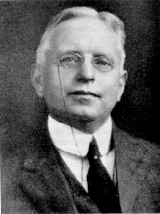| Profile | Major Works | Resources |
Richard T. Ely, 1854-1943.


American "New Generation" historicist and forerunner of the American Institutionalist School.
Considered by some as a German Historicist in American clothing, Richard T. Ely was the most prominent of the "New Generation" of German-trained American economists that emerged in the United States during the 1870s. An outspoken proponent of the historical method, Ely's is regarded by some as the father (or grandfather) of the American Institutionalist School. He was the teacher and mentor of both John R. Commons and Wesley C. Mitchell.
Richard T. Ely was educated at Columbia, graduating in 1876, before going to Germany for graduate studies. Ely spent three years at Heidelberg, obtaining his doctorate in 1879 under Karl Knies. Upon his return to America, Richart T. Ely and fellow Heidelberg-trained historian Herbert Baxter Adams, joined the faculty of the Johns Hopkins University in 1881. Founded in 1876, Johns Hopkins was the first American university to give "earned" graduate degrees in the German university model, and Ely and Adams would be responsible for leading the social sciences. Ely's efforts to transplant German Historicism into American academia led to a bitter methodological battle in 1880s with his conservative Hopkins colleague, Simon Newcomb (notably in the pages of Science magazine in 1886).
In an attempt to emulate Schmoller's Verein für Socialpolitik on American soil, Richard Ely was, with E;R;A Seligman and Henry C. Adams, the organizer and founder of the American Economic Association (AEA) in 1885. The AEA became quickly embroiled in the raging methodological controversy between old school conservatives and new school historicists. The AEA eventually abandoned Ely's vision as a normative body for social progress to become a more staid professional organization. The AEA still attaches Ely's name to its yearly distinguished lecture.
Despite the polemics, President Gilman promoted Ely to associate professor at Johns Hopkins in 1887. Perhaps warned (or wary, after the 1886 Haymarket riot, of the popular association between socialism and violence), Ely reigned in his socialist leanings in his writings for a few years. Nonetheless, Ely broke his restraint and resumed his advocacy of socialism in 1891. Reaping the whirlwind, Ely submitted his resignation from Hopkins in 1892. He also resigned as secretary of the AEA that same year.
In 1892, Richard T. Ely migrated to the "progressive" University of Wisconsin to head the School of Economic, Political Science and History. He brought with him a coterie of Hopkins men, including Frederick Jackson Turner and John R. Commons. It was under Ely that the empirical and labor bent long since associated with the University of Wisconsin was initiated. It quickly became a breeding ground for the next generation of the American Institutionalist school. Richard T. Ely's Outlines of Economics (1893) became an astoundingly popular textbook in American schools, and went through many editions with changing co-authors.
Ely's position on labor movements and socialism eventually got him in trouble again. Just a few months after the Pullman strike in 1894, a state official accused Ely of spreading socialism and involvement in union activities in Madison. This led to a controversial " trial" of Ely before the regents of the University of Wisconsin. Although the Ely trial was managed by sympathizers, and led to a rallying of American scholars in defense of academic freedom in the United States, the resolution was a bit muffled. Ely was exonerated, but only after asserting that he did not hold the views ascribed to him and acknowledging that teaching such views in a classroom might be grounds for dismissal. Nonetheless, the Wisconsin Regents issued a famous stirring statement in defense of academic freedom/
Ely's work on labor movements abated slowly as Ely grew increasingly conservative in his later years. His later work concentrated mostly on land economics.
|
Major works of Richard T. Ely
|
|
HET
|
|
Resources on Richard T. Ely
|
All rights reserved, Gonçalo L. Fonseca
